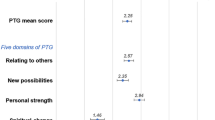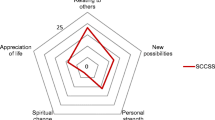Abstract
Background
The death of a loved one has great impact on family members even when the death was expected. While negative changes are reported, some individuals also report personal growth, known as posttraumatic growth (PTG). Many studies on PTG have been performed using quantitative methods and suggest that PTG may differ according to the traumatic event and cultural background.
Purpose
This study aimed to explore how Japanese bereaved family members of patients with cancer express their experience of PTG after the patient’s death by analyzing open-ended answers provided in a cross-sectional survey.
Methods
Qualitative data were collected through a survey, and thematic analysis was used to analyze the data. The present study was part of a larger cross-sectional survey of bereaved families of patients with cancer. Data analyzed in the current study were obtained from 162 bereaved family members of patients with cancer.
Results
We identified 18 sub-themes within five predefined major domains of PTG. Moreover, we also identified two additional themes: changed view of life and death, and awareness of health management.
Conclusions
The experience of PTG of bereaved family members varied considerably. Future research on PTG experiences among groups from diverse cultural backgrounds would be beneficial for understanding the concept and its clinical implications.
Similar content being viewed by others
References
Stroebe M, Schut H, Stroebe W (2007) Health outcomes of bereavement. Lancet 370:1960–1973
Holtslander LF, McMillan SC (2011) Depressive symptoms, grief, and complicated grief among family caregivers of patients with advanced cancer three months into bereavement. Oncol Nurs Forum 38:60–65. https://doi.org/10.1188/11.ONF.60-65
Allen JY, Haley WE, Small BJ, Schonwetter RS, McMillan SC (2013) Bereavement among hospice caregivers of cancer patients one year following loss: predictors of grief, complicated grief, and symptoms of depression. J Palliat Med 16:745–751. https://doi.org/10.1089/jpm.2012.0450
Shear MK, Ghesquiere A, Glickman K (2013) Bereavement and complicated grief. Curr Psychiatry Rep 15:406–419. https://doi.org/10.1007/s11920-013-0406-z
Simon NM (2013) Treating complicated grief. JAMA 310:416–423. https://doi.org/10.1001/jama.2013.8614
Miyajima K, Fujisawa D, Yoshimura K, Ito M, Nakajima S, Shirahase J, Mimura M, Miyashita M (2014) Association between quality of end-of-life care and possible complicated grief among bereaved family members. J Palliat Med 17:1025–1031. https://doi.org/10.1089/jpm.2013.0552
Gilmer MJ, Foster TL, Vannatta K, Barrera M, Davies B, Dietrich MS, Fairclough DL, Grollman J, Gerhardt CA (2012) Changes in parents after the death of a child from cancer. J Pain Symptom Manag 44:572–582. https://doi.org/10.1016/j.jpainsymman.2011.10.017
Tedeschi RG, Calhoun LG (1996) The posttraumatic growth inventory: measuring the positive legacy of trauma. J Trauma Stress 9:455–471
Calhoun LG, Tedeschi RG (2004) The foundations of posttraumatic growth: new considerations. Psychol Inq 15:93–102
Tedeschi RG, Cann A, Taku K, Senol-Durak E, Calhoun LG (2017) The posttraumatic growth inventory: a revision integrating existential and spiritual change. J Trauma Stress 30:11–18. https://doi.org/10.1002/jts.22155
Engelkemeyer SM, Marwit SJ (2008) Posttraumatic growth in bereaved parents. J Trauma Stress 21:344–346. https://doi.org/10.1002/jts.20338
Ho SM, Chu KW, Yiu J (2008) The relationship between explanatory style and posttraumatic growth after bereavement in a non-clinical sample. Death Stud 32:461–478. https://doi.org/10.1080/07481180801974760
Calhoun T, Tedeschi RG, Cann A, Hanks EA (2010) Positive outcome following bereavement: paths to posttraumatic growth. Psychol Belg 50:125–143. https://doi.org/10.5334/pb-50-1-2-125
Taku K, Cann A, Tedeschi RG, Calhoun LG (2009) Intrusive versus deliberate rumination in posttraumatic growth across US and Japanese samples. Anxiety Stress Coping 22:129–136. https://doi.org/10.1080/10615800802317841
Shigemoto Y, Poyrazli S (2013) Factors related to posttraumatic growth in U.S. and Japanese college students. Psychol Trauma 5:128–134
Sanjo M, Miyashita M, Morita T, Hirai K, Kawa M, Akechi T, Uchitomi Y (2007) Preferences regarding end-of-life cancer care and associations with good-death concepts: a population based survey in Japan. Ann Oncol 18:1539–1547
Wright AA, Keating NL, Balboni TA, Matulonis UA, Block SD, Prigerson HG (2010) Place of death: correlations with quality of life of patients with cancer and predictors of bereaved caregivers’ mental health. J Clin Oncol 10:4457–4464. https://doi.org/10.1200/JCO.2009.26.3863
Kinoshita H, Maeda I, Morita T, Miyashita M, Yamagishi A, Shirahige Y, Takebayashi T, Yamaguchi T, Igarashi A, Eguchi K (2015) Place of death and the differences in patient quality of death and dying and caregiver burden. J Clin Oncol 33:357–363. https://doi.org/10.1200/JCO.2014.55.7355
Milberg A, Wåhlberg R, Jakobsson M, Olsson EC, Olsson M, Friedrichsen M (2012) What is a ‘secure base’ when death is approaching? A study applying attachment theory to adult patients’ and family members’ experiences of palliative home care. Psychooncology 21:886–895. https://doi.org/10.1002/pon.1982
Otani H, Morita T. Meaning staying palliative care unit and/or home at the end of life for patients with cancer. The Japan Hospice and Palliative Care Evaluation Study 2016. http://www.hpcj.org/med/j_hope2016.pdf. Accessed 12 October 2017 (in Japanese)
Hirooka K, Fukahori H, Taku K, Togari T, Ogawa A (2017) Quality of death, rumination, and posttraumatic growth among bereaved family members of cancer patients in home palliative care. Psychooncology 26:2168–2174
Oxford dictionary. https://en.oxforddictionaries.com/definition/bigly. Accessed 12 August 2017
Boyatzis RE (1998) Transforming qualitative information: thematic analysis and code development. SAGE Publications
Braun V, Clarke V (2006) Using thematic analysis in Psychology. Qual Res Psychol 3:77–101. https://doi.org/10.1191/1478088706qp063oa
Taku K, Calhoun LG, Tedeschi RG, Gil-Rivas V, Kilmer RP, Cann A (2007) Examining posttraumatic growth among Japanese university students. Anxiety Stress Coping 20:353–367
Tong A, Sainsbury P, Craig J (2007) Consolidated criteria for reporting qualitative research (COREQ): a 32-item checklist for interviews and focus groups. Int J Qual Health Care 19:349–357
Lehman DR, Davis CG, Delongis A, Wortman CB, Bluck S, Mander DR, Ellard JH (1993) Positive and negative life changes following bereavement and their relations to adjustment. J Soc Clin Psychol 12:90–112
Bogensperger J, Lueger-Schuster B (2014) Losing a child: finding meaning in bereavement. Eur J Psychotraumatol 5:22910. https://doi.org/10.3402/ejpt.v5.22910
Levesque JV, Maybery D (2012) Parental cancer: catalyst for positive growth and change. Qual Health Res 22(3):397–408. https://doi.org/10.1177/1049732311421617
Mosher CE, Adams RN, Helft PR, O'Neil BH, Shahda S, Rattray NA, Champion VL (2017) Positive changes among patients with advanced colorectal cancer and their family caregivers: a qualitative analysis. Psychol Health 32:94–109
Albuquerque S, Narciso I, Pereira M Posttraumatic growth in bereaved parents: a multidimensional model of associated factors. Psychol Trauma. https://doi.org/10.1037/tra0000305
Steffen E, Coyle A (2011) Sense of presence experiences and meaning-making in bereavement: a qualitative analysis. Death Stud 35:579–609
Hirooka K, Fukahori H, Akita Y, Ozawa M (2017) Posttraumatic growth among Japanese parentally bereaved adolescents: a web-based survey. Am J Hosp Palliat Care 34:442–448. https://doi.org/10.1177/1049909115627776
Collier A, Phillips JL, Iedema R (2015) The meaning of home at the end of life: a video-reflexive ethnography study. Palliat Med 29:695–702. https://doi.org/10.1177/0269216315575677
Arnold J, Gemma PB, Cushman LF (2005) exploring parental grief: combining quantitative and qualitative measures. Arch Psychiatr Nurs 19:245–255
Helgeson VS, Reynolds KA, Topmich PL (2006) A meta-analytic review of benefit finding and growth. J Consult Clin Psychol 74:797–816
Hirooka K, Fukahori H, Taku K, Togari T, Ogawa A (2018) Examining posttraumatic growth among bereaved family members of patients with cancer who received palliative care at home. Am J Hosp Palliat Care 35:211–217. https://doi.org/10.1177/1049909117703358
Funding
This research was supported by the St. Luke’s Life Science Institute Grant and JSPS KAKENHI (grant number 15H05084).
Author information
Authors and Affiliations
Corresponding author
Ethics declarations
Primary data for this study is held with authors named on the Tokyo Medical and Dental University Review Board Ethics Approval. Data cannot be reviewed externally for ethical reasons.
Conflict of interest
The authors declare that they have no conflict of interest.
Rights and permissions
About this article
Cite this article
Hirooka, K., Fukahori, H., Taku, K. et al. Posttraumatic growth in bereaved family members of patients with cancer: a qualitative analysis. Support Care Cancer 27, 1417–1424 (2019). https://doi.org/10.1007/s00520-018-4440-6
Received:
Accepted:
Published:
Issue Date:
DOI: https://doi.org/10.1007/s00520-018-4440-6




